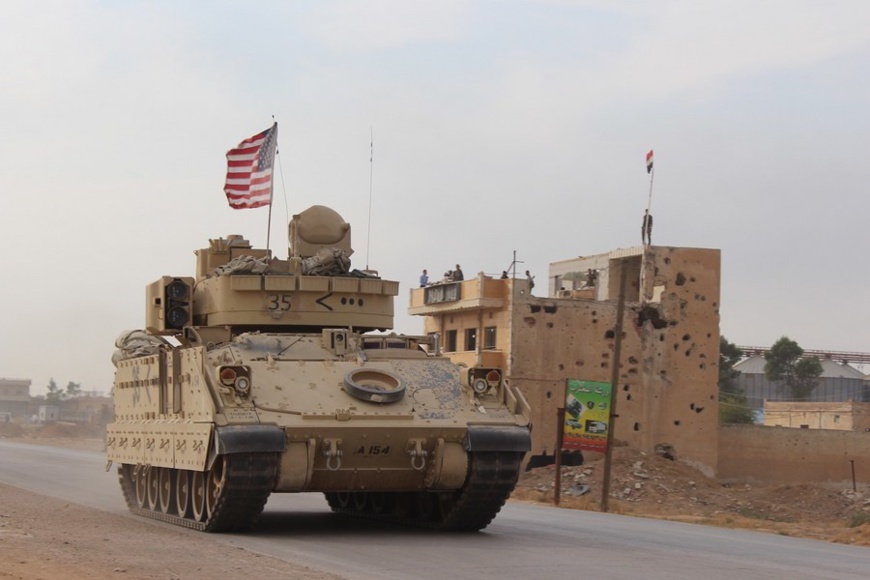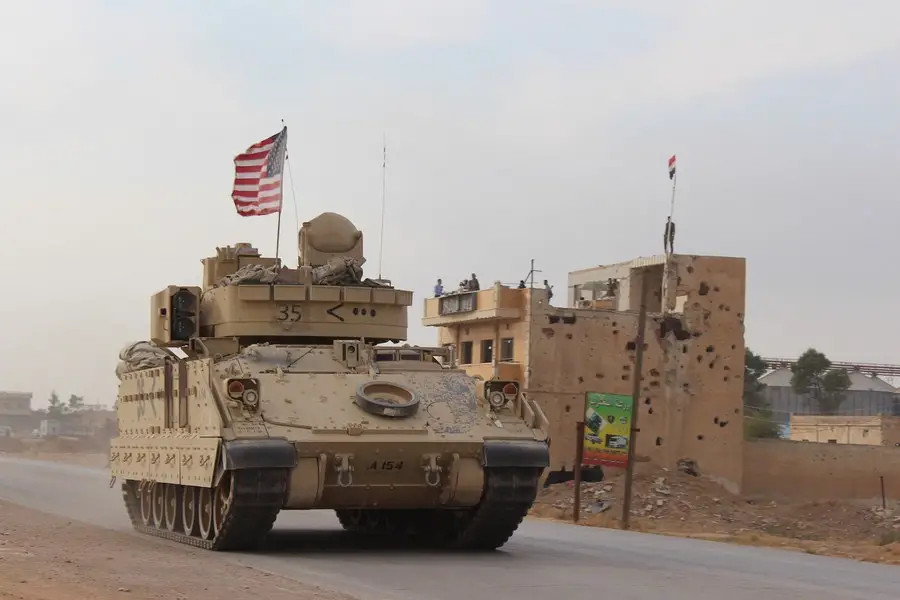By Zhong Sheng, People’s Daily

A U.S. military vehicle runs past the Tal Tamr area in the countryside of Hasakah province, northeastern Syria, on Nov. 14, 2019. (Str/Xinhua)
Although the U.S. always justifies the wars it wages abroad with various pretexts, facts have fully proved that the U.S. is a hegemonic power with an addiction to war and the greatest source of risks to global peace and stability.
The year 2021 marks the 20th anniversary of the outbreak of the Afghan war and the 10th anniversary of the outbreaks of the wars in Libya and Syria. These wars are all a result of America’s excessive and willful use of force.
The U.S. is the biggest driver behind the escalation of conflicts in relevant countries, and is inescapably responsible for the humanitarian disasters caused by these wars.
The history of the U.S. is one of constant wars of aggression and imperial expansion, according to American historian Paul Atwood, who pointed out that war is the American way of life.
Throughout about 240 years of U.S. history, there were only 16 years when it wasn’t involved in a war. After World War II, the U.S. became a superpower and found it harder to resist its desire to wage wars.
Incomplete statistics show that from the end of World War II in 1945 to 2001, a total of 248 armed conflicts happened in 153 regions in the world, among which 201, or around 81 percent, were started by the U.S.
Waging wars across the world on various pretexts, the U.S. is the real culprit threatening world peace, according to Tom Fowdy, a British political and international relations analyst.
Although some wars have ended long before, the wounds and scars they left in certain countries and the grave consequences they caused for regional security landscape can still hardly heal or be remedied.
It’s estimated that at least 800,000 tons of explosive remnants of war from the U.S. remain to this day in Vietnam, which, at the current rate, would take 300 years to clean.
Since the beginning of the 21st century, the international landscape has undergone profound changes and the international community has shown a stronger desire for peace. However, the U.S. has never stopped waging wars against foreign countries.
The war machine of the U.S. has roared all the way across the planet, inflicting disasters on countries including Afghanistan, Iraq, Libya, and Syria.
“In the early 21st century, if any power sought world domination, coercing others and flouting rules, it was the United States,” said an article published on the website of The New York Times in October 2020.
Statistics released by the Smithsonian Institution in the U.S. revealed that the wars and military operations started by the U.S. in the name of counter-terrorism since 2001 have spread to more than 40 percent of the world’s countries.
These so-called “wars on terror” have killed over 800,000 people, made more than 38 million people destitute and homeless, and are estimated to cost the U.S. government more than $8 trillion, suggested data from the Costs of War Project of Brown University in the U.S.
In summer this year, the chaos caused by the hasty withdrawal of U.S. troops from Afghanistan astonished the world.
The Afghan war that lasted for 20 years has brought untold sufferings to the Afghan people. More than 100,000 Afghan civilians were killed or injured by the weapons of U.S. armed forces and its allied forces, and over 10 million people lost their homes due to the war.
Eventually, the U.S. armed forces simply walked away irresponsibly, leaving the Afghan people to face the long-term sufferings inflicted by the war.
The huge disasters caused by those wars started and conflicts provoked by the U.S. abroad should have been a wake-up call for the country. However, up to now, the trigger-happy superpower still hasn’t reflected upon its deeds and plucked up the courage to change its course.
In order to avoid being held accountable by the international community for those wars and conflicts, the U.S. has racked its brains in proving the justifiability of its misdeeds, creating such rhetoric as Pax Americana, human rights above national sovereignty, duty to intervene and rules-based international order.
However, no matter how hard Washington tries to beautify those wars, it can neither make up for the huge loss of life caused by wars, erase the deep wounds wars left on countless families, reverse the turmoil and disorder caused by wars in other countries, nor cover up the long-term challenges wars posed to regional security landscape.
The U.S. should reflect on the pernicious influence of its war machine, pointed out an article published recently on Al-Watan, a newspaper in Bahrain.
Peace, development, and win-win cooperation have become the prevailing trend of the times. Going against the trend, the U.S. frequently interferes in the domestic affairs of other countries on the pretext of “democracy” or “human rights”, and still indulges in hegemonism and power politics.
The international community must put the U.S. under a war origins-tracing investigation, for investigating the evil consequences of the wars willfully waged by the U.S. and holding the drivers behind the wars accountable is the requirement of international justice and the international community’s responsibility to history and future generations.
(Zhong Sheng is a pen name often used by People’s Daily to express its views on foreign policy and international affairs.)
The year 2021 marks the 20th anniversary of the outbreak of the Afghan war and the 10th anniversary of the outbreaks of the wars in Libya and Syria. These wars are all a result of America’s excessive and willful use of force.
The U.S. is the biggest driver behind the escalation of conflicts in relevant countries, and is inescapably responsible for the humanitarian disasters caused by these wars.
The history of the U.S. is one of constant wars of aggression and imperial expansion, according to American historian Paul Atwood, who pointed out that war is the American way of life.
Throughout about 240 years of U.S. history, there were only 16 years when it wasn’t involved in a war. After World War II, the U.S. became a superpower and found it harder to resist its desire to wage wars.
Incomplete statistics show that from the end of World War II in 1945 to 2001, a total of 248 armed conflicts happened in 153 regions in the world, among which 201, or around 81 percent, were started by the U.S.
Waging wars across the world on various pretexts, the U.S. is the real culprit threatening world peace, according to Tom Fowdy, a British political and international relations analyst.
Although some wars have ended long before, the wounds and scars they left in certain countries and the grave consequences they caused for regional security landscape can still hardly heal or be remedied.
It’s estimated that at least 800,000 tons of explosive remnants of war from the U.S. remain to this day in Vietnam, which, at the current rate, would take 300 years to clean.
Since the beginning of the 21st century, the international landscape has undergone profound changes and the international community has shown a stronger desire for peace. However, the U.S. has never stopped waging wars against foreign countries.
The war machine of the U.S. has roared all the way across the planet, inflicting disasters on countries including Afghanistan, Iraq, Libya, and Syria.
“In the early 21st century, if any power sought world domination, coercing others and flouting rules, it was the United States,” said an article published on the website of The New York Times in October 2020.
Statistics released by the Smithsonian Institution in the U.S. revealed that the wars and military operations started by the U.S. in the name of counter-terrorism since 2001 have spread to more than 40 percent of the world’s countries.
These so-called “wars on terror” have killed over 800,000 people, made more than 38 million people destitute and homeless, and are estimated to cost the U.S. government more than $8 trillion, suggested data from the Costs of War Project of Brown University in the U.S.
In summer this year, the chaos caused by the hasty withdrawal of U.S. troops from Afghanistan astonished the world.
The Afghan war that lasted for 20 years has brought untold sufferings to the Afghan people. More than 100,000 Afghan civilians were killed or injured by the weapons of U.S. armed forces and its allied forces, and over 10 million people lost their homes due to the war.
Eventually, the U.S. armed forces simply walked away irresponsibly, leaving the Afghan people to face the long-term sufferings inflicted by the war.
The huge disasters caused by those wars started and conflicts provoked by the U.S. abroad should have been a wake-up call for the country. However, up to now, the trigger-happy superpower still hasn’t reflected upon its deeds and plucked up the courage to change its course.
In order to avoid being held accountable by the international community for those wars and conflicts, the U.S. has racked its brains in proving the justifiability of its misdeeds, creating such rhetoric as Pax Americana, human rights above national sovereignty, duty to intervene and rules-based international order.
However, no matter how hard Washington tries to beautify those wars, it can neither make up for the huge loss of life caused by wars, erase the deep wounds wars left on countless families, reverse the turmoil and disorder caused by wars in other countries, nor cover up the long-term challenges wars posed to regional security landscape.
The U.S. should reflect on the pernicious influence of its war machine, pointed out an article published recently on Al-Watan, a newspaper in Bahrain.
Peace, development, and win-win cooperation have become the prevailing trend of the times. Going against the trend, the U.S. frequently interferes in the domestic affairs of other countries on the pretext of “democracy” or “human rights”, and still indulges in hegemonism and power politics.
The international community must put the U.S. under a war origins-tracing investigation, for investigating the evil consequences of the wars willfully waged by the U.S. and holding the drivers behind the wars accountable is the requirement of international justice and the international community’s responsibility to history and future generations.
(Zhong Sheng is a pen name often used by People’s Daily to express its views on foreign policy and international affairs.)
 Menu
Menu
 America’s addiction to war causes disasters for world
America’s addiction to war causes disasters for world
















